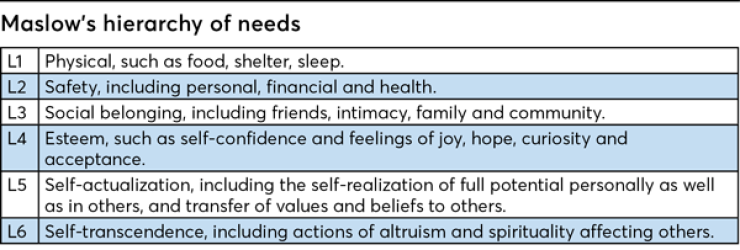“Show me the money!” is a famous line from the movie "Jerry McGuire." The movie focused in a funny way on a well-known objective: exceptional compensation for superior performance. For advisors there are many forms of compensation so when you discuss this topic with someone in your firm, you should be clear what type of compensation you’re talking about.
How people are motivated by different forms of compensation to satisfy physical and emotional needs is described in detail in Abraham Maslow’s classic 1954 book "Motivation and Personality". The key to your success is understanding how each advisor should be compensated and having a well-thought out plan so you can elicit maximum performance from people at any emotional level of Maslow’s hierarchy. The critical question for business owners and managers: How do you develop those advanced levels of advisor compensation?
To develop a completely comprehensive compensation system, a quick review of Maslow’s needs hierarchy is necessary. Maslow described his first four levels as deficiency needs (shown in the Table below) because he felt everyone is initially deficient in these areas. People are motivated to satisfy their first level needs (L-1), then satisfy L-2 needs, and so on.
I don’t write about or suggest things that require work without a good payoff. So here’s what happened at our firm during the past 5 ½ years. We increased assets under management an average of about 17% annually to $6 billion from just under $2.5 billion. For comparison, the S&P 500 increased at 13.2% annually during that same period.

The majority of our AUM growth wasn’t from acquisitions or market gains. Our total portfolio contains a significant amount of fixed-income securities and our portfolio average annual growth was less than 10% during that period, so about 8% annually had to come from elsewhere. Our best-in-business “organic” growth was the result of our advisors bringing in an immense amount of business during this period. A large part of the motivation of our advisors for this effort was our comprehensive compensation program.
Here’s what you can do to enhance your program. Using Maslow’s framework, start by creating a matrix mapping his levels against your current compensation system. This will give you some ideas how to best meet each advisor’s needs. Using us as an example, here’s Savant Capital Management’s match to Maslow’s hierarchy:
- L1-L2: Salary, team and individual bonuses
- L1-L2: Benefits such as 401K and matching; insurance; paid time off; telecommuting; flex hours
- L1-L4: Equity in the firm and annual dividends
- L3-L5: Job matching, mentoring, coaching, regular evaluations.
- L3-L5: Increases in scope of job responsibility and authority
- L4-L5: Recognition and reward for innovation and being a change agent
- L3-L5: Community involvement support and recognition
- L3-L5: Industry involvement support and recognition
- L3-L5: Professional training inside and outside the firm
- L3-L5: Marketing growth support – “I care about your future”
- L3-L6: Professional reputation growth support
- L3-L6: Professional education outside the firm support
Notice a substantial part of Savant’s compensation plan provides emotional motivation in levels L3 to L6, activities usually not considered by HR departments. Your winning system must consider emotional needs of advisors across this wider spectrum and formalize compensation which encompasses every level described by Maslow. In Maslow’s terminology, get big in your hierarchy or go home.
Before you change anything, though, take a step back and consider what you want to accomplish in the areas of compensation and motivation. You probably want to pay at or above the “industry average” salary or bonus, but can you commit to being responsive to your advisors needs to reach higher levels of motivation?
If your answer to this question is “no,” you might want to carefully consider your overarching business goals. Just don’t be surprised if good people leave your firm because you don’t change. If the answer is “I’m not sure” or “yes,” that’s a sign it’s time to evaluate and improve your compensation program.

You might think a diversified compensation system that meets every need of every advisor is incredibly complex and highly expensive. Developing and implementing formalized incentives may increase your expenses somewhat, but it can have a significant positive impact on your company’s top and bottom lines.
From an implementation standpoint, it’s relatively easy to install if you’re already doing some or much of what I have explained, but just haven’t made it part of a formal program. If that’s the case, I recommend you formalize what you already do, and make sure each advisor knows all about it. If you’re still developing your organization, consider adding these additional motivations formally to your compensation program as you grow.
By the time we had 15 employees and four advisors we were able to use nine of the 12 categories mentioned earlier to motivate. Now, with about 10 times as many people we use all 12 motivational categories. Develop and add to yours as time goes on.
The world’s currency systems (think: bitcoin) are expanding conceptually and technically. Whether you agree with their purpose, as a financial advisor you shouldn’t ignore them or the trends they represent. In the same way, you shouldn’t ignore trends in advisor compensation.
Expanding your compensation system to include cutting edge motivational rewards for advisors will assure your organization is not left behind. Doing so will propel you into the 21st century as technology, society and client expectations are changing – just as the motivational expectations of your advisors are changing. Get big or go home.





